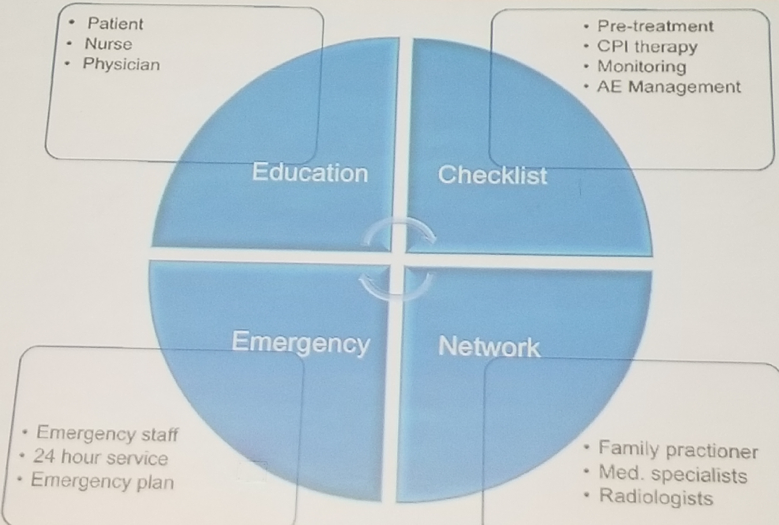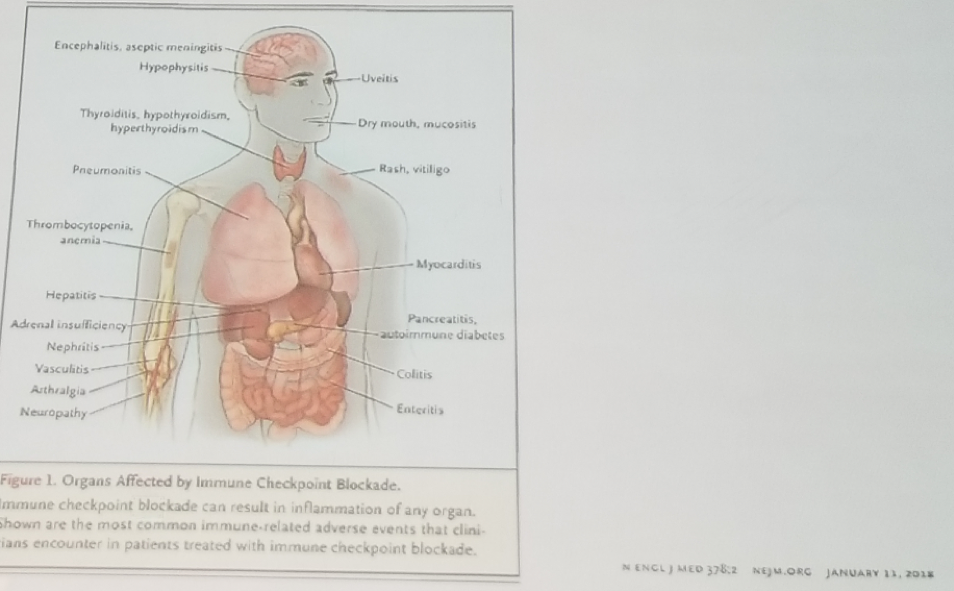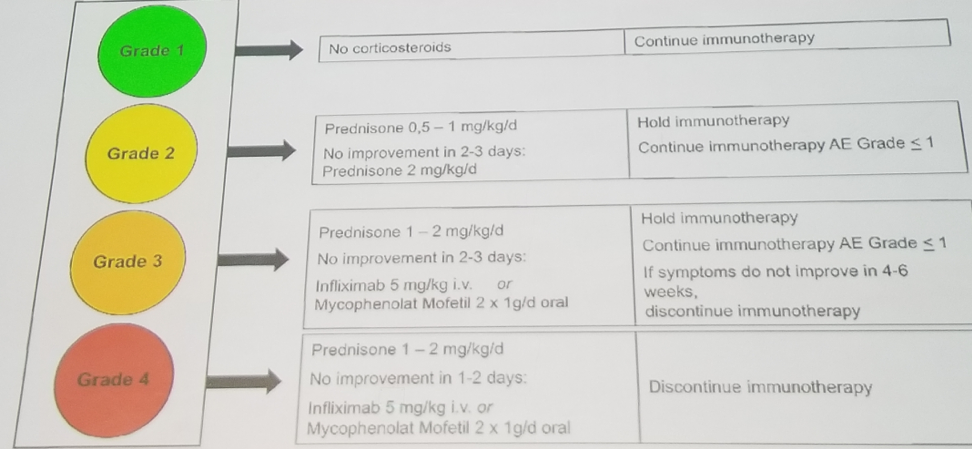Before prescribing ICPI, physicians must be educated about this specific treatment, the patient must be evaluated, and diagnostic tests need to be done, therapy performance must be assessed, monitoring for safety and efficacy must be continuous, and if adverse events occur, the physician must know how to manage them. Many factors are needed to run a clinic and a service that can provide all the needs of patients treated with ICPI. As depicted in figure 1, these include knowledgeable nurses, monitoring abilities, 24-hour emergency staff with a clear emergency plan, and a multidisciplinary team consisting of a medical oncologist, radiologists, and urologists.

Figure 1 – What is needed to maintain a service that provides and manages patients taking immune checkpoint inhibitors:
Once the service is up and running, it must be maintained on a regular basis, with continued education and updating on newly published data, continued monitoring of safety, routine discussion on cases, and improving new checklists.
During interactions with patients, physicians must remember to educate patients and their family members, before and during the treatment, provide valid, understandable information, and try to make it as easy as possible for the patients. Aside from the physician, the patient should also meet and discuss with a nurse, who should continue to educate him/her, provide information on prophylaxis and side effects, and practical information such as what to do in different situations.
The pretreatment history of the patients is most critical. It should be extensive and elaborate and collect data on autoimmune diseases, prior infectious disease, endocrine disease, organ-specific disease, and baseline bowel habits. There is also a full battery of laboratory tests that the patient should perform, including blood tests for renal and hepatic function, complete blood count, urine tests, and thyroid blood tests. The patient should also undergo an ECG and a baseline CT scan. The patient should have an elaborate wallet card, stating the medication he is on, his disease stage, his relevant history, and his future treatment plan.
When the patient is given therapy, everything should be documented accurately, and every step of the treatment should be clear to the staff treating him and to the patient himself. If any adverse effects develop this must be recorded, and proper treatment administered. The clinic should always have emergency medications available if needed, such as steroids. Before any ICPI infusion is given, a checklist should be filled by the physician, making sure it is safe to administer the medication at this time. Patients are receiving 4 -weekly infusions should be evaluated at the clinic every two weeks with appropriate tests. Imaging should be performed at regular intervals to assess disease response/progression.
The treating physician should have extensive knowledge on the myriad adverse effects that can be caused by ICPI, as shown in figure 2, and should also know how to treat them accurately and effectively, as shown in Figure 3. If deciding to administer steroids, the physician should be aware of the adverse effects caused by them, and what drugs could be administered to limit some of the side effects. These include prevention of infections brought by steroids, proton pump inhibitor for gastritis, calcium and vitamin D3 for osteoporosis, oral care to prevent oral candidiasis, blood glucose monitoring for diabetes, blood lipids for hyperlipidemia, cardiovascular examination for hypertension, and ophthalmological examination for cataract and glaucoma. Finally, how to correctly tape steroids is also the most important.

Figure 2 – The organs that can be affected by immune checkpoint inhibitors:

Figure 3 – Basic rules on how to treat side effects caused by immune checkpoint inhibitors:
During interactions with patients, physicians must remember to educate patients and their family members, before and during the treatment, provide valid, understandable information, and try to make it as easy as possible for the patients. Aside from the physician, the patient should also meet and discuss with a nurse, who should continue to educate him/her, provide information on prophylaxis and side effects, and practical information such as what to do in different situations.
The pretreatment history of the patients is most critical. It should be extensive and elaborate and collect data on autoimmune diseases, prior infectious disease, endocrine disease, organ-specific disease, and baseline bowel habits. There is also a full battery of laboratory tests that the patient should perform, including blood tests for renal and hepatic function, complete blood count, urine tests, and thyroid blood tests. The patient should also undergo an ECG and a baseline CT scan. The patient should have an elaborate wallet card, stating the medication he is on, his disease stage, his relevant history, and his future treatment plan.
When the patient is given therapy, everything should be documented accurately, and every step of the treatment should be clear to the staff treating him and to the patient himself. If any adverse effects develop this must be recorded, and proper treatment administered. The clinic should always have emergency medications available if needed, such as steroids. Before any ICPI infusion is given, a checklist should be filled by the physician, making sure it is safe to administer the medication at this time. Patients are receiving 4 -weekly infusions should be evaluated at the clinic every two weeks with appropriate tests. Imaging should be performed at regular intervals to assess disease response/progression.
The treating physician should have extensive knowledge on the myriad adverse effects that can be caused by ICPI, as shown in figure 2, and should also know how to treat them accurately and effectively, as shown in Figure 3. If deciding to administer steroids, the physician should be aware of the adverse effects caused by them, and what drugs could be administered to limit some of the side effects. These include prevention of infections brought by steroids, proton pump inhibitor for gastritis, calcium and vitamin D3 for osteoporosis, oral care to prevent oral candidiasis, blood glucose monitoring for diabetes, blood lipids for hyperlipidemia, cardiovascular examination for hypertension, and ophthalmological examination for cataract and glaucoma. Finally, how to correctly tape steroids is also the most important.

Figure 2 – The organs that can be affected by immune checkpoint inhibitors:

Figure 3 – Basic rules on how to treat side effects caused by immune checkpoint inhibitors:
Presented by: Margitta Retz, MD, Munich, Germany
Written By: Hanan Goldberg, MD, Urologic Oncology Fellow (SUO), University of Toronto, Princess Margaret Cancer Centre @GoldbergHanan at the Global Conference on Bladder Cancer 2018 - September 20-21, 2018 Madrid, Spain


